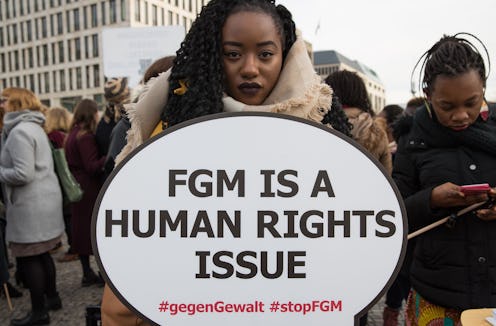News
A Judge Just Ruled That The 22-Year-Old Law Criminalizing FGM Is Unconstitutional

In a shocking decision delivered Tuesday, a federal judge ruled that America's female genital mutilation law was unconstitutional, effectively dismissing charges against two Michigan doctors, as well as six others, according to the Detroit Free Press. U.S. District Judge Bernard Friedman argued that Congress had "overstepped" in attempting to legislate the crime on a national level.
"As laudable as the prohibition of a particular type of abuse of girls may be ... federalism concerns deprive Congress of the power to enact this statute," Friedman wrote in his decision, according to the Free Press. He continued, "Congress overstepped its bounds by legislating to prohibit FGM ... FGM is a 'local criminal activity' which, in keeping with long-standing tradition and our federal system of government, is for the states to regulate, not Congress."
Six of eight cumulative charges were effectively dismissed by his decision, according to CNN. Dr. Jumana Nagarwala, the case's lead defendant, still faces a charge for conspiring to travel with intent to engage in illicit sexual conduct, as well as one charge for conspiring to obstruct an official proceeding, per CNN. This case was reportedly the first time that the 22 year-old female genital mutilation (FGM) law had ever been tested.
The defendants in the case belong to an Indian Muslim sect known as the Dawoodi Bohra, according to the Free Press. This sect reportedly believes female circumcision is a religious rite of passage, and say it only involves a small "nick."
The Michigan case revolved around nine girls who reportedly experienced FGM at a suburban clinic in Detroit. Four of the girls were from Michigan; the rest were from Illinois and Minnesota, according to CBS News.
"Unfortunately, this is going to embolden those who believe that this must be continued ... they'll feel that this is permission, that it's OK to do this," FGM survivor and activist Mariya Taher told the Free Press. She described the ruling as "crazy."
Although litigating against FGM in the United States is relatively new, international organizations have widely condemned the practice, including the United Nations, which formally and officially banned it in 2012. In a press release at the time, UN officials remarked that efforts to criminal FGM "need to be backed up with services for victims, engaging key influencers and supporting community-based activities to change social norms, as well as practical actions to bring perpetrators to justice."
The World Health Organization (WHO) has also summarily rejected FGM as a violation of human rights. "In every society in which it is practised, female genital mutilation is a manifestation of gender inequality that is deeply entrenched in social, economic and political structures," WHO wrote in an interagency statement. "Like the now abandoned foot-binding in China and the practice of dowry and child marriage, female genital mutilation represents society’s control over women."
It was not immediately clear whether or not the federal government would appeal the judge's ruling. A spokesperson for the U.S. attorney's office told multiple news outlets that they were reviewing the decision.